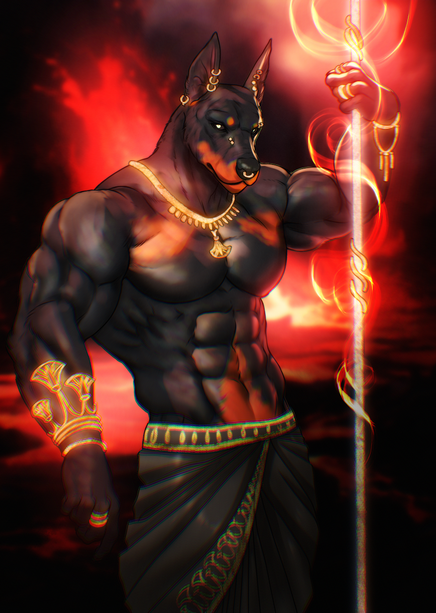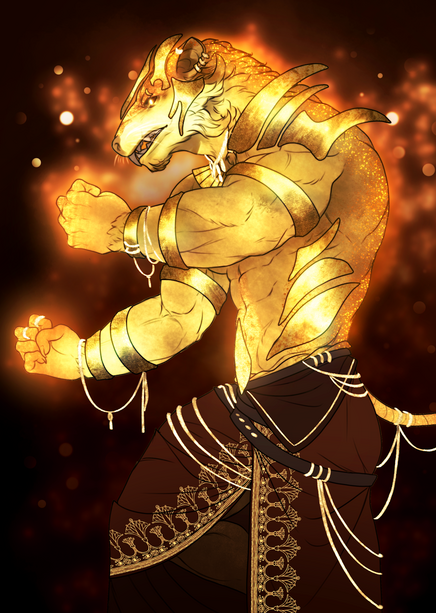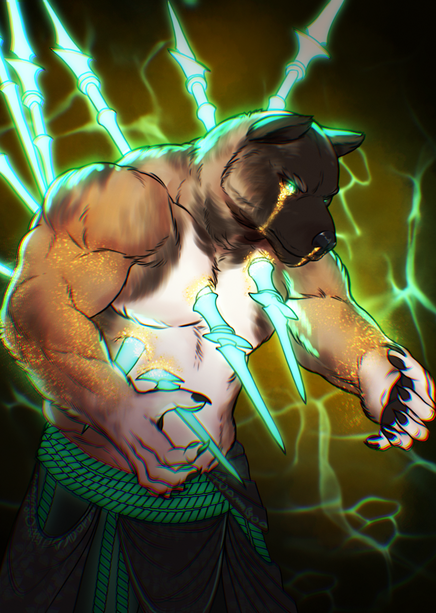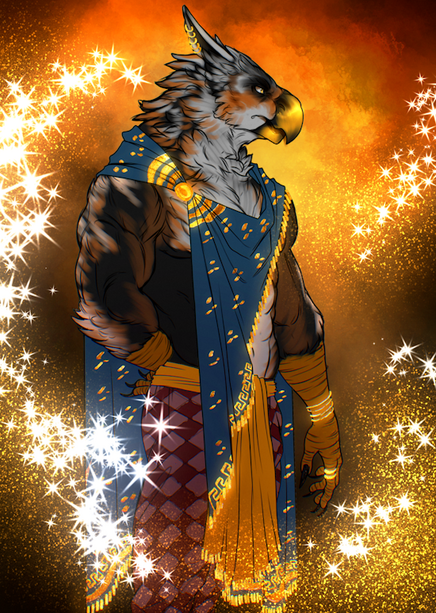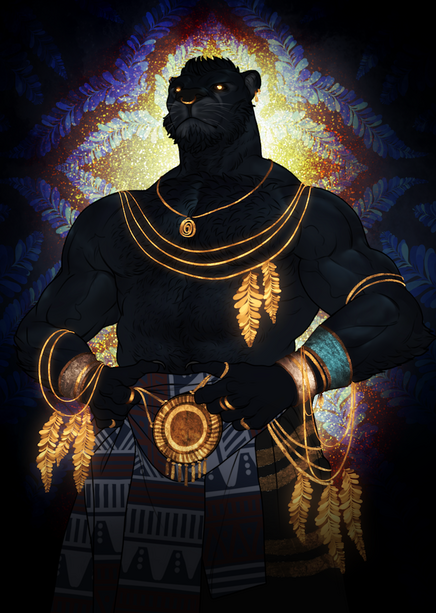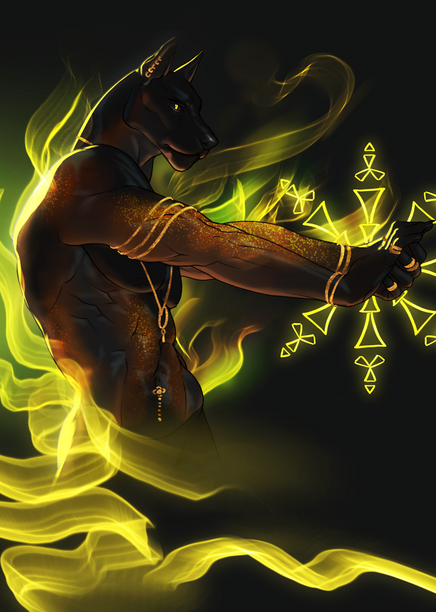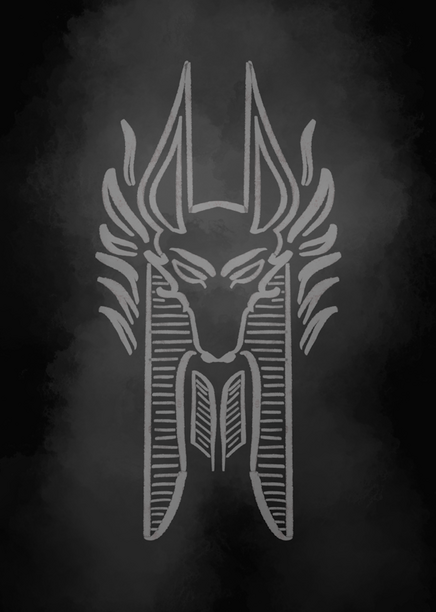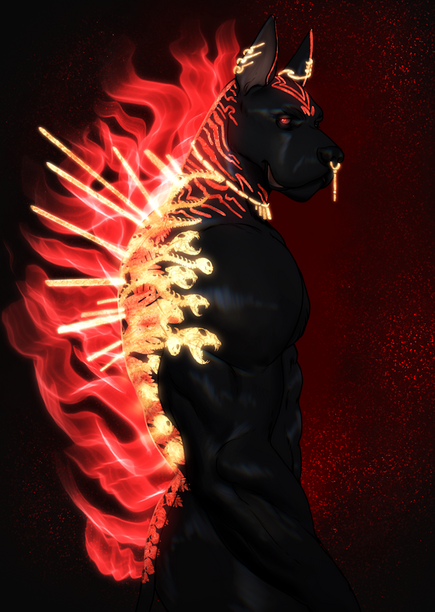More actions
| Khama | |
|---|---|
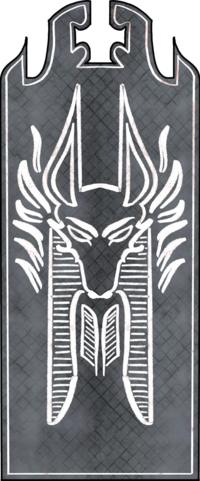 | |
| Religion | |
| Pronunciation | Kha-Ma. |
| Origins | Over 15,000 years ago. |
| Deities | |
| One unified Pantheon, and 3 optional Gods for a variant belief. | |
Khama is one of the oldest Religions in the world, dating back to the days of the Dewamenet Empire nearly 15,000 years. Originally starting as a Dewa-Asha ethnoreligion, Khama is a polytheistic Religion centered around serving the Gods as loyal subjects and living a life with karmic rightness, teaching that the world is a confluence of actions and consequences that affect the cycle of life and death for its worshipers. Khama is considered an incomplete Religion that is undergoing changes in the modern era, because of the rebirth of some of the Gods, which is an ongoing plot point.
Origins
The origins of Khama as a Religion are terribly unclear because historical records dating back to the founding and pre-Dewamenet period are effectively non-existent. The Allorn Elves spent millennia erasing the historical context of the Khama faith, and as such, there is no way of telling how the faith came into being. It is generally assumed, however, that the four grounding Gods (Tjafar, Qadreti, Akhet, Athetis) became powerful through some act of conquest, and then created more Gods that would eventually form the pantheon together. This must have happened sometime before the Dewamenet Empire's fall, and the destruction of the Meraic (Maraya) civilization much earlier.
Core Beliefs
Central Message
The central message of the Khama faith is that the faithful bodies are made of sand (implied to be Dragons), but that the soul and essence of life are created by the Khama Gods. In turn, believers must live their lives in obedience to the Gods and to their own Karma so that when they die, their souls can be weighed against the golden feathers to determine if they must pass into the afterlife, or be reincarnated in the mortal realm.
Faith Mechanic
Karma
Karma is a central concept in the Khama faith (which also is derived from its name) that refers to any action, work, or deed, having cosmic consequences for the soul of the actor. It is the central belief that people who do bad things for bad reasons, have bad things happen to them for worse reasons, and people who do good things for virtuous reasons will have goodness returned to them. While the Gods do give a general guideline for what kind of virtuous life to live, they aren't strict vices and virtues to avoid or live by. Rather, they provide a blueprint that guide the faithful into mindfulness about what they do, and what they would have done unto them in return by the laws of cosmic justice. People who live in lives of violence, have violence returned to them. People who live in politics and deceit are plotted against with lies, and so forth. Doing bad things is not considered a sin, but something that must be balanced with doing good things to create at the very least karmic equilibrium so that the faithful may enter the Afterlife, and at best karmic lightness, where a life is more defined by doing good than doing bad. In this sense, Khama is far less judgemental of the incidental wrongdoing of its worshipers than other Religions, so long as they do right in the long run.
Rebirth of the Gods
Not all of Khama's Religious doctrine is known or is known exactly in the way the Gods want it to be known due to an event that is known as the Reaving among its followers. Khama as a Religion is intensely tied to the Dewamenet Empire and the Dewa-Allorn War that ended it, because it was the state Religion of the Dewamenet Asha, and also their secular royal structure. All the Gods were kings and queens of the various Dewamenet kingdoms that comprised a unified Empire, and so when the Empire fell, the Allorn Elves went to the task of eradicating the remnants of Dewa culture, including their Religion. Some Gods were presumed dead, others went missing, and so the Religion has largely survived limping through the centuries on folklore and legend alone. Only in recent times, through efforts of mortals, are Gods being reborn and rediscovered, and are the faithful connecting to a new religious message, though old believers maintain the Dewa Variant, explained further below.
The Afterlife
The Khama afterlife is missing, which causes some long-term problems for their worshipers. If the Afterlife was to function normally, when a believer would die, the God Mauthek would retrieve their soul, and lead them to the Du'en, a vast desert that holds the scales of karma and the doorways to the Afterlife. There, Mauthek would weigh the golden feathers against the karma of one's soul, with a soul burdened by negative karma being heavier. If a soul was deemed heavy, it would be sent back to Aloria to be reincarnated, and if deemed light, would be allowed to pass into the afterlife called the Hedjet (not to be confused with the Asha cultural philosophy). However, the God Gahan stole the Afterlife and sent it into the Void, it becoming Kemet. As a result, Mauthek still retrieves souls and weighs them in Du'en, but can no longer send them into the afterlife if they are deemed light, thus condemning them to eternal wandering in the endless desert of Du'en until the doors can open to an Afterlife again. However, he does still send those with bad karma back to be reincarnated.
Gods and Goddesses
The Khama pantheon is made up of 12 Gods, while the Dewa Variant rejects two of these, and adds 3 back in. Khama worshipers strongly attach and associate with one patron God, but must worship all other Gods equally. Each God represents a particular contribution to Karma which should be strived after, though a good level of Karma can be acquired just by avoiding the vices that oppose the virtues of the Gods. Some of the Khama Gods lack art, depicted only with a gray symbol. This is because the Gods have not been seen since the Dewamenet Empire days, with many of the Gods being presumed dead or missing, though efforts are being made to rediscover the lost fragments of the past.
- Tjafar also known as the Shaper God, is the leader of the Khama Pantheon. He is the God of Justice, and the law-maker of the Pantheon, setting out the codes of life that all followers live by, but also speak on the dogma of the religion itself widely speaking. Tjafar is meant to be an impartial judge in the conflicts of the Gods, but is actually one of the biggest players, thus enforcing his seniority among them in perpetuity.
- Akhet doubles both as the War and Love God for the Khama faithful, representing a consistent duality of passion and violence brought about by military conflict. He is equally a brave, disciplined soldier or commander, and a hedonistic self-indulgent adulterer who has sired many Godborn. Akhet was known as the Reclaimer during the interlude period, leading the charge of preserving the Asha people during the Pearl Wars.
- Khannar is a God of Peace brought about by Music, but his purpose has become more complicated since the Dwamenet War and Pearl Wars. Khannar represents peace as an abstract concept found in many things, such as peace at the end of war, peace in beautiful music, or seeing art, but primarily in death. Even though he is not a Death God, he is a dealer of death and a raging enemy of the Allorn seeking their utter destruction.
- Divi is the God of all good-natured qualities of the people. He represents kindness, charity, understanding, compassion, sympathy, and camaraderie. He contains within him all the good qualities that a society needs to thrive socially, and for its people to be contented with each other. Because of this, he is often also described as a happiness God, because he seeks to please others while avoiding all conflict.
- Mauthek is the God of Death. He carries the souls of the dead to the Afterlife and weighs their Karma against the weight of a golden feather. Mauthek has largely become toothless since the theft of the Afterlife by Gahan, leaving him to essentially act as doorkeeper for the Afterlife's waiting room, a position deeply insulting and humiliating, as Mauthek is an immensely dignified God who took great pride in his work.
- Zaret is the God of glee, victory in wit, and deceit. Among the Gods, he is the most mischievous, known to play tricks on the faithful for his amusement and to play great schemes over the centuries for anti-climactic conclusions. While Zaret is held with some mistrust, those who seek fortune or success with lies always end up seeking out his favor, causing him in a way to also double as a wealth-God, for great capital is built on lies.
- Athetis is the Goddess of the heavens and knowledge of the witnessing of the moon. She is the most intelligent of the Khama Gods, but also the most detached from material reality, having reached a higher understanding of the world. Her moonlight gaze pierces all lies and unknowing, meaning she is outright worshiped to acquire foresight into the unseen and knowledge of the unknown, yet her gaze is fixated on the stars.
- Qadreti is the Goddess of Change and Progress. While Qadreti was once a simple Goddess of the seasons, her identity became so much more complicated and ever-changing when she absorbed the essence of an unknown God, became metallic, and had a worship form around her that centered around replacing all body parts with living metal ones. Qadreti is also considered a Goddess of inventions as such.
- Sefruat is the God of building a legacy for one's self, to be remembered by others after death, and to leave things behind in the world that tangibly remind the living of the dead. This includes things such as crafting, creation, architecture, literature, but also great deads and big events. Sefruat is a highly Magical God, as he is the patron of the Silontaar, who are Magical Asha people, which puts him at odds with the Dewa Gods.
- Ankheti is a Goddess of Life, which extends itself to fertility and even themes of being an earth mother in the prosperity of deep mines. It is said that she breathes life into each new faithful born to the Gods and that her identity is less the meek expectation of a benevolent protectress, and more of a violent benefactor. To Ankheti, death is the ultimate defeat, and mortals should rage against the dying of the light.
- Ra'mut is a God with wanderlust who is on an eternal journey to find new places, but also to find himself. To Ra'mut, life is a complicated journey in which new things are discovered, and new skills are gained. In his worship, the faithful pray for success in their training or honing of skills, and perfection in their execution. He is seen as a patron of hobbies and freedom, due to his carefree and curious nature.
- Pahtia is the Goddess of art and by extension of Culture. Pahtia is the most tragic of the Khama Gods, because she was very explicitly killed by the Elven Gods during the Dewamenet war, causing the events that ended that war, and all that happened after. Her death is seen as such a strong focal point of Khama history, that it has started to define all Khama and Asha art, with depictions of mortuary cults and death rites.
Dewa Variant
The Dewa Variant of Khama is nearly identical except that it has retained some of the Gods that the modern Khama faith has rejected while rejecting some of the new Gods in the Khama pantheon. It should be noted that this is a schismatic belief in theory, but in practice, they are still treated as the same Religion. There are however obvious differences:
- The Dewa Variant rejects the worship of Divi, arguing that Divi opted voluntarily to depart from the Khama pantheon, and that his reconciliation with Tjafar at a later point is mere theatrics and a divine ploy from Tjafar to expand his power. They believe Divi brings no useful things to the table.
- The Dewa Variant rejects the worship of Sefruat, arguing that Sefruat was born long after the pantheon became dysfunctional, and that the Silontaar have been so far removed from Dewa history and the source of their spiritual culture, that it is laughable to include this God in the Pantheon.
- While the Dewa Variant and the main Dogma consider each other some form of heresy, their opposition is far more benign than the schisms between the Unionist variants. There is no violence between them, and they work together against common enemies and towards common goals and holidays.
- It is entirely feasible to see a Dewa Variant and main Dogma worshiper stand side by side as avengers in the name of Khannar, beating up an Elf together while praising the Gods in unison. They work together, but pray separately in private, and have different internal monologues on Karma.
- The only marked difference between the Dewa Variant and main Dogma, is that they perform Divinium Summonings without the other present, and that they can enter the Afterlife held by Gahan in the Void, though only if they agree to become a Spirit in the Afterlife that serves him.
- Because of the inherent qualities of the Dewa Variant Gods, Khama gains a lot darker overtones when worshiped through the lens of the Dewa Variant. Dewa Variant worshipers do not reject the conflict between the Gods during the Dewamenet Days, holding a different view of Karma.
- Karma to the Dewa Variant worshipers is not the measure of a good and righteous soul, but a strong one (not in the physical sense, but in the spiritual, mental, and self-reflective sense). To them, one should not be kind because it is a good virtue, but because kindness takes mental effort.
- In short, Karma is more the cosmic weight of a soul, worn down by having taken shortcuts and easy decisions in life which show weakness and frailty, or made lighter by having made uncomfortable hard decisions, showing tenacity, dedication, resourcefulness and general strength.
- The Dewa Variant worships 3 extra Gods that the main Dogma does not. Each of these Gods committed minor crimes, but their primary reason for expulsion, is because their patronage is incompatible with modern Karma, and because their themes are deemed responsible for the Dewa Rot.
- Gahan was once the God of Order and structure, but has since become more complicated. Much of Khama society structure was ordained by Gahan, who directed the hierarchies of classes and the rules of social convention between them. However, when the Dewamenet Empire fell, he took the Afterlife, stole it into the Void, and merged it with the capital of the Dewamenet Empire to freeze it in time in another dimension.
- Kazheron is the God of Control and Power. He is no longer observed in the main Dogma, because his qualities are incompatible with the more modern interpretation of karma, the other Gods believing that the desire for control and power, inherently provoke habits that are anti-karma. Kazheron is however still worshiped by old Dewa believers for the means to control others, and thus control events around one's self.
- Nephka is the Goddess of Purity which in its simplest interpretation means an anti-Magic God. Nephka has deemed Magic a corruption of the body and soul because it is ungovernable and because it makes Karma unreadable. Charity performed by conjuring gold with Magic is not true charity, but a false indulgence of the believer's soul. A difficult choice solved with Magic was never difficult, for Magic is always a cheat to her.
Priestly Activities
Lore to be written about Priestly Work and Priests for the Khama Religion, which is centralized and follows a hierarchy.
Reclaimers
Lore to be written about Reclaimers, religious warriors who fight to restore the faith and Allorn Elven repression.
Expanded Lore
The Expanded Lore section contains additional contextual information about the Khama faith. This section is not necessary to read to get a good understanding of the lore, just the background information.
God Family Ties
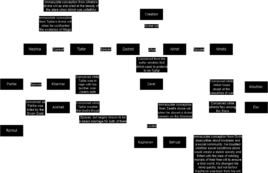
As seen in the image on the right, the Khama Gods are all related to each other in one way or another. It is unclear whether these family ties are brought about by the folklore and legends created by their followers, or whether these Gods were actually created in these exact conditions. Scholars cannot say for certain that the totality of history did not see Gods creating other Gods, and there is no definitive proof that Gods cannot sire new Gods into being when they reproduce with other Gods, it just so happens to be the case that the Gods of all currently known Religions do not procreate. As a result of these assumptions, the prevailing theory is that because the Khama Gods are from a different era in time, the Gods of that world functioned differently than modern-day Gods. Indeed, there is perhaps a theory continuation from the idea that modern Gods can observe the conflict and chaos inherent in pantheons where new Gods are born and die, and decide to avoid that same fate. The Khama Gods are some of the oldest Gods left in the world, and their idiosyncratic behavior as well as their time during the Dewamenet Empire, seems to reinforce the idea that family ties between Gods are generally a bad thing. It should also be noted, that while many of these relations seem explicitly incestuous, they are not, purely by virtue of the fact that Gods are not real people, they do not grow up together, and they have no biological connection to one another. Their essence and creation are almost entirely spiritual, and they share no deeper familial connection like mortals would understand it.
The Dewa Rot
Dewa Rot is a concept that the dogmatic Khama worshipers apply as the reason for their failure, and it is founded in the materialist approach the Gods took to worship during the Dewamenet Empire days. In the simplest of assessments, the Dewa Gods were more like warlords than actual Gods. Their divinity was true, but they ruled secular kingdoms like secular kings and engaged in politics and even warfare with one another. These kings and queens coveted land and each other's richness, and their wars led to the deaths of their own subjects over otherwise trivial notions of land ownership in a mostly cohesively unified Empire. The Dewa Rot refers to the idea that Gods holding personal and material dominion over the people, seeing them as not only their divine but earthly subjects, led to a corruption in the faith that inevitably enabled its fall at the hands of the Allorn Elves (who in turn fell to the same corruption, according to Khama believers). Dewa Variant believers reject this notion. While they do not dispute the fact that wars between the Gods were disastrous for their followers, they walk a finer balance by acknowledging the bad, while also acknowledging the good, in that these wars made the Gods stronger, and were mainly the reason why their people thrived during the Dewamenet Empire days, specifically because their Gods had experience in divine warfare and could out-compete the Gods of other Religions.
Karmic Codes
Karma may require a bit of extra explaining, because while the above section gives a good quick run-down, the exact application of Karma may differ from Character to Character. Each of the Gods represents a Karmic Code. These Karmic Codes do not need to be followed by the letter, and it is also not necessary to follow all of them at once. But, in line with living a balanced, or better than balanced life, if one chooses to ignore the Karmic law of one God, one should live by the law of two others to balance Karma. If one for example is a Corsair that is violent to the innocent, one absconds the Karmic Code of Divi, so they abide by the Karmic Codes of Athetis by educating themselves and reading a lot, and Sefruat by making sure that their legacy as a Corsair will outlive them and be a point of pride for their people. That way, the karmic injustice of living a violent life, is balanced by living an erudite and colorful life. This person will still have violence inflicted upon them through Karmic justice, but in return, also knowledge will come to them, and their efforts to be remembered will bear fruit, while their soul weighs lighter than the golden feathers.
- Tjafar stands for the Karmic Code of lawfulness, living to the letter of the law and applying it to others.
- Akhet stands for the Karmic Code of passion, to make war and love with great passionate dedication.
- Khannar stands for the Karmic Code of peace, to bring peace in all its varied ways whether through calmness or death.
- Divi stands for the Karmic Code of kindness, to be charitable, loving, sympathetic, and compassionate of others.
- Mauthek stands for the Karmic Code of dignity, to be dignified in the face of adversity, and to show bravery and poise.
- Zaret stands for the Karmic Code of truth, to be in control of one's truth, or control the perception of that truth by others.
- Athetis stands for the Karmic Code of knowing, not being ignorant in one's life, and seeking education and enlightenment.
- Qadreti stands for the Karmic Code of progress, to never stand still in life, to seek improvement and betterment at all times.
- Sefruat stands for the Karmic Code of legacy, to make beautiful things and to leave behind things to remind the world of one's self.
- Ankheti stands for the Karmic Code of life, to protect life, and to foster the creation of life wherever possible.
- Ra'mut stands for the Karmic Code of skill, to become skilled at certain things, and to make the world a better place with them.
- Pahtia stands for the Karmic Code of culture, to embrace one's heritage, and make others' lives more vibrant in cultural experiences.
Then, there are also the three Gods of the Dewa Variant who have their own Karmic Codes.
- Gahan stands for the Karmic Code of structure, to live a life of loyalty to one's betters and friends, and obedience to masters.
- Kazheron stands for the Karmic Code of power, to project control and dominion over others, or to expand the domain of one's master.
- Nephka stands for the Karmic Code of purity, to not engage in Magic, and to rebuff Magic around one's self.
Dewa Variant Karma
Dewa Variant Karmic believes requires a bit more explanation because there are some careful nuances to consider. The Dogmatic belief of Karma is very simple, a person who holds Mauthek in high regard, for example, will choose bravery over cowardice, because bravery is good, period. Dogmatic Karmic beliefs are very black and white, but Dewa Variant beliefs are more nuanced. While they believe bravery is generally good, the Dewa Variant believers may opt for cowardice in some instances, because it is specifically the more difficult choice. Bravery sometimes leads to self-sacrifice, an unwinnable fight, or a lost war that is still being fought, causing its soldiers to die in battle and be brought to the afterlife as a reward for their sacrifice. Dewa Variant believers instead say that bravery in those instances is meaningless because they didn't actually sacrifice anything or accept difficulty. Dying and going to the Afterlife, is seen as a reward, and a death in battle is only furthering along the inevitable. In this instance, choosing cowardice to live another day is seen as the more Karmic action, because it is the more difficult one. Choosing cowardice would mean having to live with the consequences of this act, and also to be around to deal with the aftermath of the lost war, with all the labor and toil that rebuilding requires. This logic can be furthered onto other Karmic Codes also, for example, to be kind to people who are evil and cruel, is more difficult than being kind to people to whom it is easy to be kind. To love a violently tempered parent or sibling is more difficult than to love one's spouse who has already committed to love. The Dewa Variant believers do not reject small acts of effortless Karma, they just believe that the more difficult choice leads to actual Karma. Dogmatic believers in return think this is contradictory nonsense because they apply more linear logic. For example, in the case of choosing cowardice because it is more difficult, that assessment may be true but the outcome for the dogmatic believers will still be that they will have cowardice inflicted on them in return. If this whole section had to be summarized, it would be summarized as such: Dewa Variant Karma is more about the weight and difficulty of the action, than the pure morality of it. Small acts lead to small good Karma, big acts lead to big good Karma.
Gahan's Crime
The exact actions Gahan took that led to Kemet being created as it is known today, beg additional explanation. Gahan as a God represented state authority and structure. Much of how Dewamenet statehood was ordained and designed, was by his hand, and it was by his will that the societal structures were kept in place. He ordained the God-Kings and Queens, he ordained the nobility and the aristocrats and intelligentsia and set up the rules of how these groups should interact, where they should live separate from the commoners and lower social castes, and what social mobility existed if at all. To Gahan, statehood was a carefully orchestrated machine that had every small aspect micromanaged to the finest detail.
When the Dewamenet Empire became the target of massive Allorn Elven Magic that would wipe out the majority of the Khama worshipers among the Asha, Gahan in a split second before the spell landed, stole the Khama afterlife, merged it with the capital of the Dewamenet Empire called Desh-eret and broke into the Void with it, thus creating a pocket-realm within this Dimension which defied its own rules. The act was so violent, that it turned all the people who lived in Desh-eret into Void Spirits, which Gahan then immediately conscripted into his Spirit army to go about conquering the other Sovereigns of the Void so that he would be the undisputed master of all Void Demons.
The exact morality of this supposed crime as Tjafar defined it, remains up for intense debate. Gahan acted without the consent of Desh-eret's inhabitants but did save them from being wiped out by Elven Magic. He did not help save the Empire at large but saved its capital, which still exists in a perpetual stasis of re-living the last day of the Empire's fall. The inhabitants were conscripted into Demon warfare but were given eternal life and powers beyond their imagination. The still-living Khama worshipers cannot enter the afterlife, having to resort to a pseudo afterlife created by Mauthek in the waiting room of the actual afterlife which can no longer be reached. To many Khama worshipers, Gahan is a criminal and a traitor who used what little was left for his own personal gain after cutting his losses with the other Khama Gods, and to some, he remains the only savior who saw through all the insanity of the Dewamenet-Allorn War and saved what little he could. Whatever the individual views, Gahan remains both an Evolist God trapped in the Void and a still observed and worshiped God of the Dewa Variant of Khama.
Trivia
- The naming similarity between Kazheron and the Evolist God Katheron is no coincidence. Rather than perhaps being the same person, the name Katheron was loaned and changed in the Allorn language syllables, Allorn Elves in essence stealing his name to name one of their new Dark Gods.
